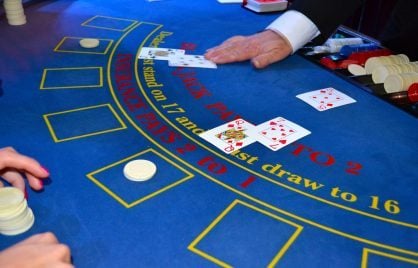Top Stories from the Casino.org blog
Insights from the world of online gaming and beyond.
Derby Fever: Ultimate Kentucky Derby States Index
Time to dust off your fascinators as we’re off to the races – it’s Kentucky Derby time! Dubbed “The Greatest Two Minutes in Sports”, fans across America are saddling up to celebrate the embodiment of equestrian excellence, accompanied by a few Mint Juleps of course. In...
April 18, 2024
—
4 min read
What Are The Odds of Winning The Lottery & Why Do People Still Do It?
April 16, 2024
—
9 min read
From Fairways to Fortune: Who Are The Top 10 Richest Golfers Of All Time?
April 22, 2024
—
6 min read
Most Popular
Infographics
The Most Superstitious Fan Bases Across Major Professional Sports Leagues
January 17, 2024
—
4 min read
Industry
What is Deck Penetration in Blackjack? (And Why It’s Important)
November 14, 2023
—
5 min read
Latest
Everything You Need To Know About Arbitrage Betting To Guarantee A Profit
Arbitrage betting, or ‘arbing’ for short, is where you place bets on all possible outcomes of a sporting event. If...
April 18, 2024
—
6 min read
NFL Betting: What Is An Octopus In Football? And Can You Bet On It?
When a team scores a touchdown, they have the option to score an additional one or two points. An octopus...
April 17, 2024
—
6 min read
National Comic Book Day: America’s Favorite Comic Book Characters
Wham! Kapow! Boom! There’s nothing quite as iconic as the world of comic books, where vibrant illustrations, onomatopoeic words, and...
April 15, 2024
—
4 min read
The Best Gaming Cities in the US
The skyrocketing growth of the gaming industry in America is no secret, with the video game market projected to soar...
April 15, 2024
—
5 min read
What Ever Happened To Tommy Hyland?
Card-counting hero and blackjack legend Tommy Hyland earned a place in the Blackjack Hall of Fame back in 2002 –...
April 10, 2024
—
4 min read
Gaming Industry Study: Carbon Emissions of Top Video Games
What do video games and jumbo jets have in common? Carbon emissions, of course! Although we have to consider scale,...
April 10, 2024
—
4 min read
Unmasking The NFL: How Much Do NFL Mascots Make?
Every football fan knows players and coaches make mega money, but how much do NFL mascots get paid? The average...
April 8, 2024
—
5 min read
Basketball 101: How Many Periods Are In A Basketball Game? NBA vs NCAA
NBA and NCAA Men’s games each have a different number of periods that last for varying amounts of time. There...
April 5, 2024
—
4 min read
US Cities with the Most Swifties Per Capita
It’s me, hi, I’m a Swiftie, it’s me! With 53% of Americans identifying as Taylor Swift fans and 4.35 million...
April 5, 2024
—
4 min read
Behind The Neon Lights: How Do Casinos Make Money?
Casinos make money because every game has a house edge created for it. That edge is usually achieved in either...
April 3, 2024
—
4 min read
Blackjack House Edge: How To Beat The Odds
The blackjack house edge is between 0.5% and 2%. While this house edge is quite low compared to many other...
April 2, 2024
—
6 min read
Influencers at Coachella: America’s Take on Influencer Invasion
Coachella is renowned for its top-tier musical lineups and trend-setting fashion statements. From iconic headliners like Lana del Rey or...
April 1, 2024
—
3 min read
Soccer 101: What Is Relegation In Soccer?
In soccer, relegation is one of the worst things that can happen to a club. In short, if relegated, the...
March 28, 2024
—
6 min read
April Fool’s Day Survey: Is it no laughing matter?
Salt in your coffee, “kick me” notes on your back, and xeroxed copies of rear-ends on the work copying machine,...
March 26, 2024
—
3 min read
The Psychology of Gambling: Why Do People Gamble?
Hold your breath folks, because here it comes: Over 1.9 billion players played in casinos around the world in the...
March 26, 2024
—
4 min read



















